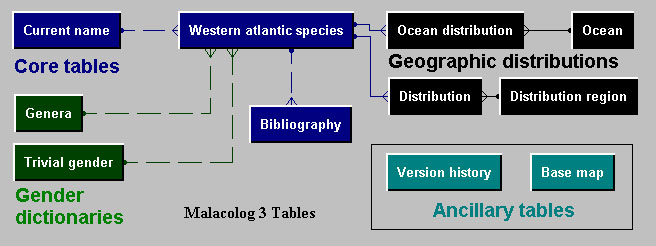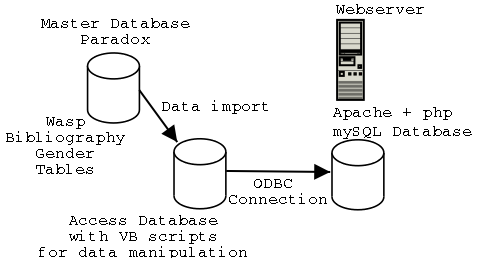
Malacolog Version 4.1.1
A Database of Western Atlantic Marine Mollusca


|
Malacolog Version 4.1.1A Database of Western Atlantic Marine Mollusca |

|
Malacolog is a database for research on the systematics, biogeography and diversity of mollusks. Malacolog attempts to document all names that have ever been applied to marine mollusks in the Western Atlantic from Greenland to Antarctica. Gastropod species have the most complete coverage, bivalves, polyplacophorans, aplacophorans, monoplacophorans and scaphopods are a work in progress, and cephalopods include only a small subset of names. The database was originaly described in Rosenberg (1993).
The following wildcards are available ? [match any one character], * [match zero or more characters]. Wildcards can be placed before, within or after a string. The wildcards _ [match any one character] and % [match zero or more characters] are also recognized and are shown in sql queries listed with results. Wildcards will work in most fields, but not in fields for years.
Each search displays the sql query that was run against the database. As data relevant to your criteria may exist in more than one field, this query may be quite complex. Some searches will provide a link allowing you to edit the where clause of your query. Some of the relevant field structures are shown below. Searches have been designed to hide most of the complexity of the database from you, and should produce reasonable results most of the time. Results may well contain records you did not expect due to automatic insertion of wild cards for some fields in some searches.
If you are not sure where to start searching, you can browse molluscan families and geographic regions.
Geographic regions searches will return those taxa having records in the particular geographic region selected, not those having only records in that region's children or parents.
Author Search Search for names in current use by authors of names. This search returns all current names where the author searched on occurs in the synonymy. Author names may include apostrophies or diacritic marks, and the search engine will only find exact matches against those characters. If you are not finding an author you expect to find, try inserting diacritics or wild cards into that author's name. Cut and paste diacritic marks from this list ‰ · Â È Ë Ì Ò Û ˆ ¸ ˙ if you cannot generate them from your keyboard. Alternately, use ? in place of character with diacritic mark. For example: d?orbigny finds d'Orbigny, and m?ller finds Müller and Möller. The following are all valid author searches: *Adams* A. Adams* A. Adams auct. non A. Adams Adams & Reeve
\nEnter only one search term in each field. To find all species listed in both Patella and Helcion run two searches, one on Patella, the other on Helcion.
If you use data from Malacolog in a scientific paper, please use this citation: Rosenberg, G. 2009. Malacolog 4.1.1: A Database of Western Atlantic Marine Mollusca. [WWW database (version 4.1.1)] URL http://www.malacolog.org/. It is not necessary to cite the date on which Malacolog was queried, as a new version number is assigned each time the data are updated.
Malacolog was first described in: Rosenberg, G. 1993. A database approach to studies of molluscan taxonomy, biogeography and diversity, with examples from Western Atlantic marine gastropods. American Malacological Bulletin 10:257-266.
To cite the search interface or information model, please use this citation: Morris, P.J. and G. Rosenberg, 2005. Search interface and documentation for Malacolog, an online database of Western Atlantic marine Mollusks. [WWW database (version 4.1.1)] URL http://www.malacolog.org.

Details for several of these tables are listed below, see also the more complete information model for Malacolog 4. The web database tables contain several departures from normal forms. Some of these are legacy fields from the early development of the database as a flat file in paradox 3. Others are redundant fields used to reduce joins between tables or text concatenation, and to improve the performance of queries on the web.

The master tables for malacolog are paradox files on a file server. These data are imported into a MS Access database, and massaged with visual basic scripts to bring the data to a more normal form, to search for inconsistencies, and to prepare them for the web. The Access db is used to upload a clean set of the data to a mySQL database via an odbc connection. The data are then provided to the world using php embedded in html.
 | ||
|
|
|
|